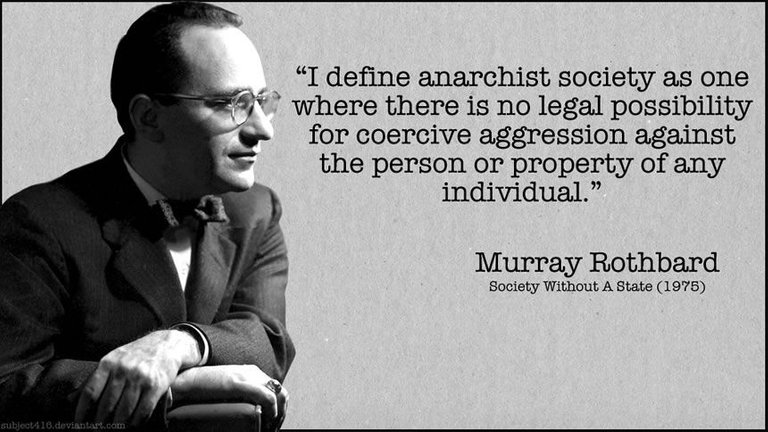
The State is not going anywhere, and anarchists would be good to recognize this. They're unlike a private business that one may boycott and watch its demise. They of course don't operate on voluntary payments, nor is it a real demand of the market, but supplied in coercion. Neither do they throw their hands up and quit once they feel they've no longer served the people, as a businessman might do upon realizing he has no product anyone values.
Instead, as humans just like us, they're interested in raising their income and preserving their position as non-contractual property-consumers. Worse, though, all these otherwise good people have become convinced that "I'm just doing my job", and so see nothing wrong with their role in society.
Those in government aren't the only ones who think aggression is essential for civilization. The State redistributes property to buy the public support that's necessary to its existence, all while the "citizens" it has turned into socialists are fooled that it is acting out of benevolence. They think, without it, that we would all be poorer; or at least the poor wouldn't be cared for anymore.
But it is exactly the accumulation of wealth, and the private investment of capital that produces even more wealth to go around, i.e., which "the poor" can benefit from the most. Government is only a destroyer of property values, not a value-adder to property. Anarchism is not a problem of poverty, but would be a world of relative prosperity as compared to the government-plundering one we live in. It seems a common objection then is that it, implied truly enough, would be a world of inequality
Of course, they go to great lengths too to defend themselves as necessary servants of the public's interest, while treating private entrepreneurs undertaking investments for profit in the voluntary market as the actual class of exploiters, in which they're [the State] only here to protect us from. Unless one is holding a wrong-headed Marxist theory of exploitation (that capitalists rule over employees), it's clearly the members of State that, by not living by the rules everyone else must live by, i.e., that justified property ownership is that which is originally or voluntarily acquired, are the expropriators.
The difference in private criminals and public criminals, then, is the public criminals have the sanction of the public who is unwilling to show resistance to it through a long cultivation of public sentiment towards its reverence. The nationalism bred so long keeps them from thinking clearly; surely, they reason, "our" government isn't out to get us; indeed they need to prevent all these private, property-thieves (criminals) from running amok.
To additionally dupe them, it does after all allow some of them to join the class of exploiters, using the State's "law"-making ability to reward their own companies, protect themselves from competition, and for them to take a part in the massive theft that is democracy. The "we are the government" notions are fully set in at this point. "If you don't like it", they will quickly tell you, "then run for office if you want to make a real change." Debate and change can only be had in their minds in between a small space in the political arena; it isn't true (to them) that the means of surviving and thriving come from the market economy, where voluntary cooperation is happening.
Anarchism as Rothbard has defined it above is something that we can conceptually have. We could remove the institutionalization of theft over broad pieces of land that is known as the State. Now, some argue that anarchism would just lead back to the State again. But if this is true, then wouldn't they at least be willing to give it a try since we definitely already have an aggressive State? If a small government must exist at all, what it does to me is remind the people constantly of their natural rights, existing only as a center of ideological support against its own self. Of course, this couldn't be expected, and this is why I think minarchists are wrong.
No real anarchists would contend, though, that all criminals will go away. We're not utopian in this regard, as is often claimed. We would however assert that without such cover for a mass-theft of property that democracy provides to the business of the State, that, minus this, there would in fact be much less theft; and with it, an increased incentive to earn an income by way of the economic means of producing, rather than the previous option of using the socialism of the state to expropriate property it is not an original or voluntary contractor of.
We might indeed form "collectives" in this anarchist society; this isn't against any voluntaryist-anarchist principles. Indeed, as man is a self-interested individual that receives more value for his product when he has incorporated himself into a division of labor, he very well might do so. A life of self-sufficiency cannot yield such a standard of living as can being part of an economic system. But the difference between this, and local or state governments as we know them, is that these individuals are contracting with each other. They're choosing, by consent, to arrange their properties together and associate in this way. They're not forcibly collectivized as statist-socialism does to a population, and so free to leave the collective if they so choose.
I'm not sure we'll ever honestly be able to bring about anything like a libertarian society in my lifetime. Assuring this change requires a turn in public opinion; for the masses to shake off the divisiveness the government has placed before them and to unify against the idea of an exploitative-class of people (those making up the State) who get to live at our expense, and who apply a different law to themselves than they have laid out for us.
I don't think that arguments for practicality should keep one from opposing statism. In fact, getting there might be a means to criticize us (though we have strategies, too). The philosophy of non-aggression, however, is quite on lock-down and I believe impervious to attacks. We're not wrong to be anarchists because we may never have anarchism. I object to the state on principle: that it rests on the very aggression it pretends it is needed to get rid of. It's a principle stance; not just a pragmatic one.
You'll often hear people say, as they do of Communism, that "anarchism is good in theory, but we'll never have it." To be sure, we might not, and this much is true. But this, to me, is a shameless giving-up of principles against the very real obstacles we have in our way to achieve liberty. If every inventor gave up on his invention at every foreseeable roadblock to bringing it about, then there would be a lot less technology, and perhaps we'd be living in poorer times.
But we don't abandon economic laws or principles because statism attempts to distort and pervert them. Economic propositions are under the notion of "all things equal." They're not meant to hold predictive power, and therefore cannot describe how a society or an economy might look fifty years from now as some mainstream economists might pretend to do. It is the science of action, and of logically-true deductions from this axiomatic beginning. We might state that increasing the supply of money decreases its purchasing power or causes prices to rise, if all things were equal. However, if the demand for money were to rise, then this might negate the theory playing out in reality; and this would leave others to proclaim the theory is bad, though this isn't true. People essentially hold the same reservations for anarchism, though, again isn't true, that they need examples; theory is insufficient. Basically, we're given statism because people struggle with basic economics.
The point is though that many things regarding anarchism should be answered with "I don't know." The need to always be right keeps us libertarian-anarchists, who are generally smarter than the public regarding economic matters, from answering honestly: that we don't know how everything will look like. In fact, this is just why we are anarchists: because the State couldn't possibly plan a society, know the intricacies of it, know the utilities of various individuals, know how much to supply of X, etc.
I hope that the conceptualization of an anarchist society and how it could work, which is a step outside the bounds of economic logic which can be said to be true, would not deter anyone from accepting anarchism as a philosophy.
Perhaps it's a problem that people are complacent and fear the unknown, and since most aren't entrepreneurial-minded and thus willing to take risks in an uncertain future, they're less so willing to accept one which isn't drawn-out for them as the State pretends to offer. The "planned-society", i.e., the statist-way, is the one that makes sense to them. Anything else is too spontaneous.
Despite these setbacks, I'm still an anarchist.
recognize one human being (other than myself) as having an inherent right to rule me. That person is commonly known as Jesus, and I believe that He is literally the God who made me and all the universe.Hi, @mikemorris, thanks for this well-stated and clearly reasoned piece. I would answer your title question in the affirmative. In fact, I would say that I presently enjoy "anarchy" because I only
I can easily, however, cooperate and collaborate with other voluntaryists because I strongly believe in the nonaggression principle. In other words, I will never seek to "rule" others.
There are certain pragmatic areas in which I (temporarily) "go along to get along" with the thugs who pretend to rule me; but I feel that the more I am able to "fly under the radar," the better I learn how to keep wealth out of their hands, and the more influence I have on my neighbors to help them see and recognize the value of living by principle, the better off all of society will become.
Will we ever reach a total "absence of the state" circumstance? Perhaps not. Nevertheless, I am more hopeful now than ever that we can and will go a long ways in that direction as I continue to see distributed, non-coercive tools (like blockchains and cryptocurrencies) being developed. I hope to see the state collapse under its own weight and become progressively less powerful.
Thanks for the read and your comment. It could certainly happen at anytime that the public becomes swayed, but I'm just about as hopeful as Mencken is that it will.
One sheep at a time, one by one... ;) 😄😇😄
